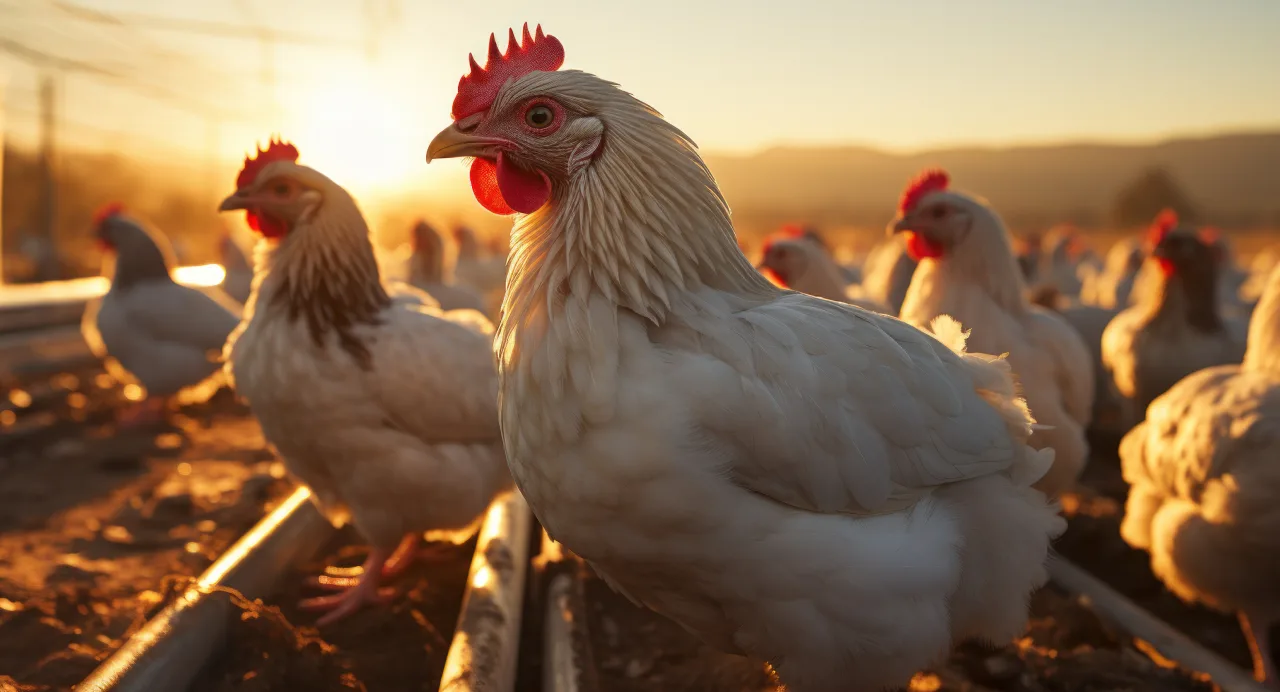Fill The Form To Get Quote
Our Other Services
Experience The Best Poultry Farming

Poultry integration refers to the vertical integration of various stages of poultry production under a single management system or company. This integration streamlines the entire supply chain, from breeding and hatching to feed production, grow-out operations, processing, and marketing. The goal of poultry integration is to increase efficiency, reduce costs, and ensure consistent quality in the final product.
Key Components of Poultry Integration:
Breeding and Hatching:
Breeding Farms: These farms focus on producing high-quality parent stock (breeder chickens) that lay eggs, which are then incubated.
Hatcheries: Eggs from the breeder farms are sent to hatcheries, where they are incubated and hatched into chicks.
Feed Production: Integrated poultry companies often own feed mills that produce the specialized feed required for different stages of poultry growth. Controlling feed production helps ensure the quality and nutritional content of the feed, which is crucial for the health and growth of the birds.
Grow-Out Operations:
Broiler Farms: These are the farms where chicks are raised to market weight. The birds are provided with a controlled environment, proper nutrition, and health care to ensure optimal growth.
Contract Farming: Many integrated companies use contract farmers to raise broilers. The company provides the chicks, feed, veterinary care, and management guidance, while the farmer provides labor and housing.
Processing Plants:
Slaughter and Processing: Once the broilers reach market weight, they are transported to processing plants owned or controlled by the integration. Here, the birds are slaughtered, processed, and packaged for sale.
Further Processing: Some integrated companies also have facilities for further processing, such as cutting, deboning, and preparing value-added products like nuggets or ready-to-cook meals.
Marketing and Distribution:
Sales and Marketing: The final products are marketed and distributed to various channels, including retail, wholesale, food service, and export markets. Integrated companies often have their own distribution networks, ensuring efficient delivery and reducing reliance on third parties.
Quality Control and Compliance:
Quality Assurance: Integrated companies maintain strict quality control measures at every stage of production to ensure product safety, consistency, and compliance with regulations.
Animal Welfare: Integration allows for the implementation of uniform animal welfare standards across the entire production chain, which can be a selling point for consumers concerned about ethical practices.
Advantages of Poultry Integration:
Cost Efficiency: By controlling the entire production chain, integrated companies can reduce costs through economies of scale, bulk purchasing, and optimized resource use.
Consistency and Quality: Vertical integration ensures consistency in product quality, from feed to final product, which is critical for brand reputation and customer satisfaction.
Risk Management: Integrated operations can better manage risks such as fluctuations in feed prices, supply chain disruptions, or disease outbreaks by having control over key inputs and processes.
Market Power: Integrated companies often have more significant market influence, allowing them to negotiate better terms with suppliers and buyers, leading to increased profitability.
Innovation and R&D: Integrated companies are often better positioned to invest in research and development, leading to innovations in breeding, feed formulation, and processing techniques.
Challenges of Poultry Integration:
High Capital Investment: Vertical integration requires significant investment in infrastructure, technology, and management systems.
Complex Management: Managing an integrated operation requires expertise across various stages of production, from breeding and feed production to processing and marketing.
Market Dependency: Integrated companies may be more exposed to market fluctuations, as they rely on consistent demand for their products to maintain profitability.
Poultry integration has become a dominant model in the industry due to its ability to deliver efficiency, quality, and profitability. It allows companies to control the entire production process, ensuring that every stage meets high standards and aligns with business goals.
Promotion
Earn Up to 55% Profit with Royal Farms’ Integrated Poultry Model!
Start your poultry journey with Royal Farms and earn up to 55% profit through smart integration and expert-led farm support.
Our USP for Our Integrated Poultry Farming EC Shed
Precision, Performance, and Profitability – All Under One Roof
Royal Farms poultry operations lies a unique blend of innovation, efficiency, and farmer-centric practices. Our Environmentally Controlled (EC) Sheds are designed to deliver consistent quality, optimal bird health, and seamless integration across every stage of poultry production.
Climate-Controlled Precision

Our EC sheds maintain ideal temperature, humidity, and airflow, ensuring stress-free growth conditions, better feed conversion, and healthier birds year-round—regardless of external weather.
End-to-End Integration

From hatcheries to processing and marketing, every stage is managed under one system, ensuring quality control, cost efficiency, and consistent output across the value chain.
Farmer Empowerment Model

We provide farmers with chicks, feed, training, and veterinary support—empowering them with low-risk, high-reward opportunities and boosting rural employment and livelihoods.
Profit grows where smart farming begins — Royal Farms empowers Coimbatore with integrated poultry solutions.
- Royal Farm

Our Integrated Poultry Farming EC Shed
Royal Farms Brings Profitable Poultry to Coimbatore
Royal Farms introduces its advanced Integrated Poultry Farming model to Coimbatore, offering local farmers a smarter, more profitable way to grow. With climate-controlled EC sheds, expert guidance, and end-to-end support, we empower you to raise healthier flocks, reduce risks, and earn up to 55% more profit.
Why Choose Us
Your Trusted Partner in Smart, Scalable, and Sustainable Poultry Solutions
At Royal Farms, we don’t just build poultry sheds—we build success stories. Our integrated EC shed model combines cutting-edge technology, expert guidance, and a farmer-first approach to deliver unmatched performance, productivity, and profitability.
Climate-controlled sheds for healthier birds and higher yield in all seasons.
From chicks to market—one streamlined, efficient poultry system.
Hands-on support from our experienced team at every step.
Grow at your own pace with guaranteed return on investment.

Testimonials
Voices That Trust Royal Farm
real stories that inspire trust in Royal Farm.










